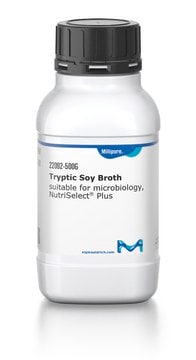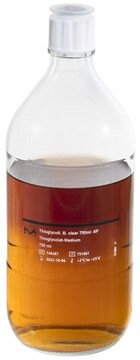70157
Thioglycollate Broth (USP Alternative)
suitable for microbiology, NutriSelect® Plus
Synonym(s):
Alternative Thioglycollate Medium, Fluid Thioglycollate Medium, NIH Thioglycollate Broth, TG Broth
About This Item
Recommended Products
sterility
non-sterile
Quality Level
form
powder
shelf life
limited shelf life, expiry date on the label
composition
L-cystine, 0.5 g/L
dextrose, 5.5 g/L
pancreatic digest of casein, 15.0 g/L
sodium chloride, 2.5 g/L
sodium thioglycolate, 0.5 g/L
yeast extract, 5.0 g/L
manufacturer/tradename
NutriSelect® Plus
final pH
7.1±0.2 (25 °C)
application(s)
food and beverages
sterility testing
microbiology
suitability
anaerobic bacteria
nonselective for Aspergillus spp.
nonselective for Bacillus spp.
nonselective for Bacteroides spp.
nonselective for Candida spp.
nonselective for Clostridium spp.
nonselective for Escherichia coli
nonselective for Pseudomonas spp.
nonselective for Staphylococcus spp.
nonselective for bacteria (General Media)
nonselective for coliforms
Application
Preparation Note
Other Notes
Footnote
The designations basic, plus, or prime are added to indicate the quality control level, from basic quality control to standard QC plus to prime for full regulatory compliance.
Legal Information
Signal Word
Warning
Hazard Statements
Precautionary Statements
Hazard Classifications
Skin Sens. 1
Storage Class Code
11 - Combustible Solids
WGK
WGK 3
Personal Protective Equipment
Choose from one of the most recent versions:
Already Own This Product?
Find documentation for the products that you have recently purchased in the Document Library.
Customers Also Viewed
Articles
Some Bacillus species are crucial for advancing our understanding of bacteria, while others can be harmful, acting as spoilage organisms or pathogens. Nevertheless, all these species are significant in biotechnological research.
Some Bacillus species are crucial for advancing our understanding of bacteria, while others can be harmful, acting as spoilage organisms or pathogens. Nevertheless, all these species are significant in biotechnological research.
Some Bacillus species are crucial for advancing our understanding of bacteria, while others can be harmful, acting as spoilage organisms or pathogens. Nevertheless, all these species are significant in biotechnological research.
Some Bacillus species are crucial for advancing our understanding of bacteria, while others can be harmful, acting as spoilage organisms or pathogens. Nevertheless, all these species are significant in biotechnological research.
Our team of scientists has experience in all areas of research including Life Science, Material Science, Chemical Synthesis, Chromatography, Analytical and many others.
Contact Technical Service













